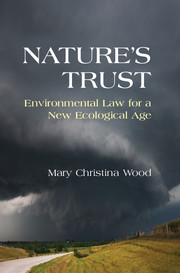Book contents
- Frontmatter
- Dedication
- Contents
- Preface
- Acknowledgments
- Part I Environmental Law: Hospice for a Dying Planet
- Part II The People’s Natural Trust
- Part III The Public Trust and the Great Transition
- 12 Nature’s Trust and the Heart of Humanity
- 13 Using Earth’s Interest, Not Its Principal
- 14 The Public Trust and Private Property Rights
- 15 The New World: A Planetary Trust
- Notes
- Index
15 - The New World: A Planetary Trust
Published online by Cambridge University Press: 05 June 2014
- Frontmatter
- Dedication
- Contents
- Preface
- Acknowledgments
- Part I Environmental Law: Hospice for a Dying Planet
- Part II The People’s Natural Trust
- Part III The Public Trust and the Great Transition
- 12 Nature’s Trust and the Heart of Humanity
- 13 Using Earth’s Interest, Not Its Principal
- 14 The Public Trust and Private Property Rights
- 15 The New World: A Planetary Trust
- Notes
- Index
Summary
The last time we saw anything like this was never…. I don’t know how to say it any clearer than that it is the largest threat to human life our state has experienced in anyone’s lifetime.
Connecticut Governor Dannel Malloy, remarks in response to Hurricane Sandy’s approach, October 28, 2012As climate vengeance strikes communities with greater frequency and horrifying intensity, citizens across the planet now bear witness to the lethal consequences of humanity’s industrialized path. Yet environmental law, society’s major instrument to impart ecological responsibility, does little to bring human actions into compliance with Nature’s laws – the laws that really count. In fact, environmental regulation hastens this course of disaster. This book began by explaining how that could possibly be.
Arising primarily from statutes passed in the 1970s, the field of environmental law stands as a failed legal experiment. The administrative state vests agencies with breathtaking power that came justified by one simple assumption: officials will deploy public resources and invoke their technical expertise on behalf of the public interest. Instead, too many environmental agencies today use their power to carry out profit agendas set by corporations and singular interests. As Part I of this book explained, environmental agencies have fallen captive to the industries they regulate. Consequently, they use the laws’ permit provisions to legalize the very damage the statutes were designed to prevent. Nearly across the board, environmental statutory processes do not prohibit harm: they permit it.
- Type
- Chapter
- Information
- Nature's TrustEnvironmental Law for a New Ecological Age, pp. 335 - 352Publisher: Cambridge University PressPrint publication year: 2013



